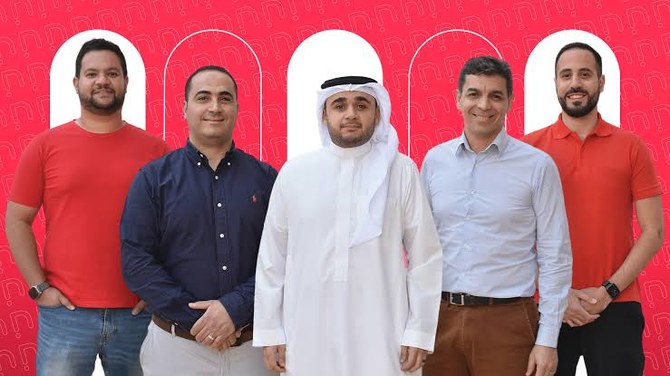CAIRO: Saudi Arabia-based food technology startup NOMU has successfully raised $5 million in a funding seed round from a range of investors, including DIV Capital, Shurfah, Core Vision, and Purity for Information Technology, as well as family offices such as Altoukhi Family Office and Bakr Family Office.
The newly secured funds will be utilized by NOMU to expand its presence in the hotel, restaurant, and catering sector.
Additionally, the company plans to develop a software as a service solution and an artificial intelligence-enabled procurement chatbot.
Moreover, NOMU has plans to extend its operations to Pakistan and sub-Saharan Africa in the near future.
The company was established in late 2022 following a merger between commerce startups Saudi-based Jumlaty and Egypt’s Appetito.
The successful funding round demonstrates the investor confidence in NOMU’s business model and growth potential, according to a statement.
“We are thrilled with the overwhelming support we have received from our investors, both in terms of funding and strategic partnerships,” said Shehab Mokhtar, co-founder and CEO of NOMU Group.
With the fresh capital infusion, the company is well-positioned to enhance its market presence, expand its product offerings, and capitalize on emerging opportunities in the food tech sector.
“This seed round allows us to strengthen our business-to-business HORECA (hotel, restaurant, and catering) offering, invest in cutting-edge technology, and expand into new markets. NOMU is committed to revolutionizing the food tech supply chain, providing greater convenience and efficiency for businesses in the MENA (Middle East and North Africa) region,” Mokhtar added.
The company operates in Saudi Arabia, Egypt, Tunisia and Morocco with plans to expand into 50 new cities by 2025.
UAE’s HR technology firm alfii raises $2.5m in a pre-seed funding round
The UAE-based human resources technology startup alfii has successfully raised $2.5 million in a pre-seed funding round led by Preface Ventures, a US-based venture capital firm, along with the participation of Kayan Ventures, Aditum Ventures, and Wayfinders.
Founded in 2022 by Yousef Al-Barqawi, Becky Jefferies and Dina Mohammad-Laity, alfii aims to assist growing businesses in managing their HR workload and streamlining administrative tasks.
With the newly secured funding, alfii plans to expand its team and further develop its HR automation platform, which is powered by financial technology solutions.
“We’re looking to build the next generation of this product class, and we’re building it entirely in-house — which means we need to bring on world-class talent to grow our business and better serve our customers,” said Al-Barqawi, alfii’s CEO and co-founder.
The investment will support the company’s growth strategy and enable it to better serve its clients by optimizing its HR processes and improving overall efficiency.
Additionally, several local and regional angel investors contributed to the funding round.
Morocco’s Chari raises $1.5m in funding
Morocco-based business-to-business e-commerce and fintech startup Chari has successfully raised $1.5 million in funding from Verof-Kepple Africa Ventures.
The investment will play a crucial role in enabling Chari to expand its operations across Africa and further develop its portfolio of financial services.
Founded in 2020 by Ismael Belkhayat and Sophia Alj, Chari offers a platform that allows retailers to directly purchase large quantities of inventory items from suppliers.
By facilitating efficient business-to-business transactions, Chari aims to streamline the procurement process for businesses.
“We are thrilled to onboard VKAV as our partner as we establish a cutting-edge and fundamental financial services infrastructure for the mass market in our country,” Ismael Belkhayat, CEO and co-founder of Chari, said, adding: “With VKAV’s extensive network across Africa and profound connections with the Japanese corporate society, we believe they will consistently bring value to our endeavors.”
In addition to the funding, Chari has appointed Ryosuke Yamawaki, a partner at VKAV, as a strategic advisor.
“Chari is uniquely positioned to transform the informal retail sector and redefine the category of informal trade in Africa. We firmly believe that their innovative approach will benefit the local market and serve as a showcase to the rest of the world,” Yamawaki said in a statement.
This strategic collaboration will provide valuable insights and guidance to support Chari’s growth and strategic decision-making.
The recent funding round marks Chari’s third successful fundraising effort this year.
In March, the company secured a seed round from Plug and Play and received $1 million in funding from Orange Ventures.
MENA startups raise $35.6m in June
Startups in the MENA region secured $35.6 million last month across 45 deals, closing the first half of the year at $1.6 billion.
In terms of funding value, Saudi Arabia claimed the top position in June, securing $25 million across 12 rounds, followed by the UAE as a distant second, with its startups raising $6 million through 20 rounds.
Egyptian startups ranked third in terms of capital received with $4.8 million, largely due to a $3.5 million funding round for Egypt’s trucking marketplace, Trella.
Fintech emerged as the sector with the highest number of deals, as seven startups raised $3 million.
However, it was the foodtech space that received the largest funding, with over $20 million raised across four startups, representing 56 percent of the total funds secured. Investor interest was also seen in other sectors such as logistics, esports and mobility.























